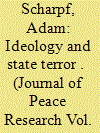| Srl | Item |
| 1 |
ID:
158212


|
|
|
|
|
| Summary/Abstract |
How does ideology influence state terror? Studies on state repression have looked at the leaders’ decisionmaking to explain how much violence states use against internal enemies. However, government leaders usually rely on their security forces to produce violence. I argue that distinct ideological beliefs within the military apparatus produce different levels of repression even if leaders are determined to terrorize the population. I expect officers who share the ideology of their leader to willingly execute the government’s repressive program, while officers who do not share the leader’s convictions refuse to terrorize civilians. I study these dynamics in the case of Argentina’s Dirty War (1975–81) during which the government tasked its ideologically divided army with a nationwide terror campaign. Combining qualitative and quantitative data from historical sources, I identify the ideological beliefs and repressive behavior of military commanders. Consistent with my expectation, I find that loyal nationalist officers in the infantry, artillery, and communications branch of the army perpetrated significantly more violence than liberal cavalry officers who rejected the junta’s terror program. The results demonstrate that ideological beliefs within the state’s security apparatus can lead to violent outcomes that deviate from government orders.
|
|
|
|
|
|
|
|
|
|
|
|
|
|
|
|
| 2 |
ID:
191989


|
|
|
|
|
| Summary/Abstract |
How do international sports events shape repression in authoritarian host countries? International tournaments promise unique gains in political prestige through global media attention. However, autocrats must fear that foreign journalists will unmask their wrongdoings. We argue that autocracies solve this dilemma by strategically adjusting repression according to the spatial-temporal presence of international media. Using original, highly disaggregated data on the 1978 World Cup, we demonstrate that the Argentine host government largely refrained from repression during the tournament but preemptively cleared the streets beforehand. These adjustments specifically occurred around hotels reserved for foreign journalists. Additional tests demonstrate that (1) before the tournament, repression turned increasingly covert, (2) during the tournament, targeting patterns mirrored the working shifts of foreign journalists, (3) after the tournament, regime violence again spiked in locations where international media had been present. Together, the article highlights the human costs of megaevents, contradicting the common whitewashing rhetoric of functionaries.
|
|
|
|
|
|
|
|
|
|
|
|
|
|
|
|